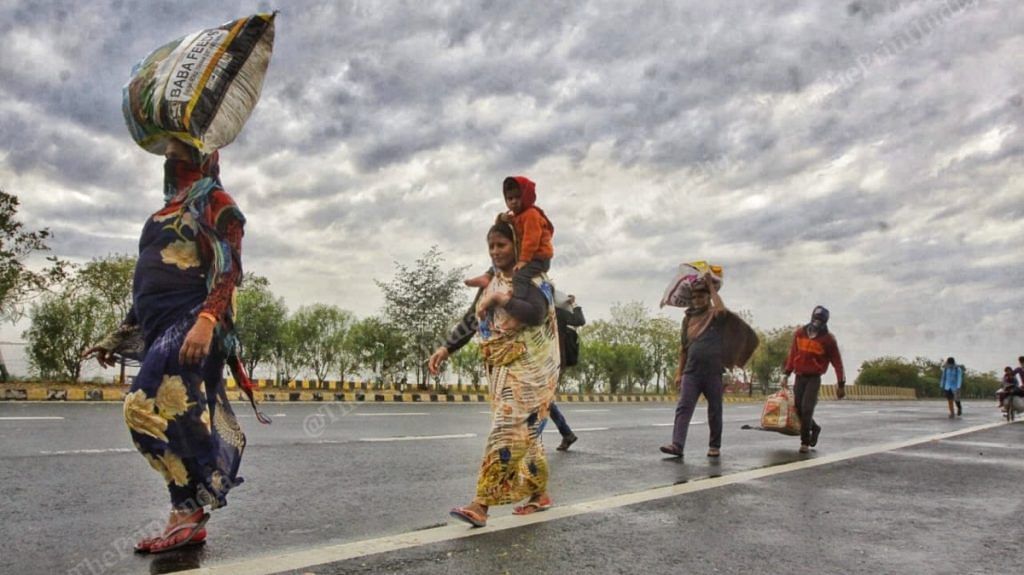Display of solidarity is a wonderful political act, especially on Twitter, Facebook and Instagram. But #MeTooMigrant is the most vile, cringeworthy and ignorant hashtag ever. In fact, it upends the very notion of empathy.
It began as a way of standing together with the massive migrant workers crisis in India during the coronavirus lockdown. But the privileged have ended up mocking the migrants’ plight.
The hashtag has been gaining rapid popularity, with people sharing ‘stories’ about how they too, are migrants. The ‘intent’ of the hashtag is to show solidarity to the lakhs of migrants on the road, trying to reach home amid the lockdown.
Also read: Over 1 lakh migrants to return on 114 trains by Saturday night: UP govt
Invalidating the struggles of the lesser privileged
When Tamara Burke started the #MeToo movement back in 2006, one could possibly not have imagined that one of the outcomes would lead to a predator like Harvey Weinstein land in jail. And one would also not have imagined that it would be trivialised to belittle the struggles of the dispossessed and the underprivileged.
We will employ domestic workers, many of whom are migrants, but hesitate to serve them water in the glasses we drink in. Imagine ourselves as the migrants.
Also read: Migrant workers clash with police in Surat, over 100 detained
Taking it too literally
The hashtag seems to have originated, drawing its ‘legitimacy’ from the literal meaning of the word ‘migrant’. One tweet added a screenshot of the definition for validating the hashtag.
Poor labourers alone are not the migrants.
If you have moved from your usual place of residence to another to find work or better living conditions, then you are migrant.
If it's so, say, #MeTooMigrant pic.twitter.com/vE56QI85Tk
— हम प्रवासी #TheMigrants (@hum_pravasi) May 9, 2020
It is of course easy to blithely overlook the criticism this seemingly neutral, yet surprisingly dehumanising term has garnered over time. In fact, those who have compared themselves to migrants may simply have Googled the definition of ‘migrant’ brought in ‘big’ names like Shah Rukh Khan and built a community of ‘online migrants’, totally blinded to the irony.
Mr Modi is from Gujarat in Delhi
Shah Rukh Khan is in Mumbai from Delhi
Dr Shashi Tharoor is from Kerala in Delhi
Kirti Azad is from Bihar in Delhi
Arnab Goswami is from Assam in Mumbai
We are all migrants. #MeTooMigrant
— Sanjay Jha (@JhaSanjay) May 9, 2020
Also read: Amit Shah is ‘lying’, West Bengal govt planned eight trains for migrants: TMC
India’s unwanted citizens
There are crores of migrants in India and they are among the worst-hit due to the lockdown announced by Prime Minister Narendra Modi. Many have been forced to tread the strenuous walk back to their homes in India’s hinterlands. Many have also tragically died in this journey, be it out of sheer exhaustion, or in accidents.
It would be safe to say that India has taken zero cognizance of the dignity and livelihoods of migrant workers who are struggling to survive in an economy that is ironically dependent on their labour.
Also read: Jobs are a memory for millions now. If migrants don’t return, productivity will be a memory
Too cool to not use a hashtag
Our sympathies lie more with the haunting photographs of migrant workers rather than the humans in them. This could be another reason behind the popularity of this hashtag–it looks ‘cool’ to be concerned.
Our criteria to declare ourselves as migrants are extremely trivial. We imagine that if we do not live with our family, or are away from home for work, or studies, and missing our near dear ones, we too are ‘migrants.’
80% of the present officer workforce is posted out of their Hometown!! Many bankers r posted 2000-3000Km away from his hometown on account of transfer policy made by banks & this extransfer cycle repeats every 3-4 years!! Willingly or Unwillingly, its our Life Now.#MeTooMigrant
— BankersUnited@Official (@Bankers_United) May 9, 2020
I am also a migrant labour.
Are you?
I left my home for work 20 years back. What is your story #MetooMigrant
— Ashish (@AshishXL) May 9, 2020
And it’s not just limited to the people who we can for a moment assume to say are not ‘woke’. Even journalists who are well aware of the plight of these migrants have been using this hashtag to highlight their journey.
I am a migrant too. I left Lucknow long back for college in Delhi and have been here since. Your story? #MeTooMigrant https://t.co/UqVuEg3Zcv
— Rohini Singh (@rohini_sgh) May 9, 2020
Some have taken the ‘I do not have a life outside work’ a bit too seriously and compared their situation to migrants cycling hundreds of kilometres, or huddled in overcrowded buses, sprayed with chemicals, to reach their homes.
I am migrant too.
Left Hometown in 2008,
3 years in Delhi, then transferred to Chennai (Salem) 2 years,
After that Hyderabad for 3 years, after that Bhopal for 3 years.
Now posted 400Km away from my hometown.
Bank give me salary but took life out of it, FOREVER!#MeTooMigrant https://t.co/neTGUz7wQ4— प्रशान्त रावत (@rawatprashantt) May 9, 2020
I am reminded of a Boman Irani dialogue from the movie Waqt–A Race Against Time. The dialogue has since then turned into a meme. Boman’s character in the movie is always ready with his one-upmanship saying: “Arey yeh toh kuch bhi nahi”. Everything seems to be a competition. Even being the ‘poor privileged person’.
A generation that can easily afford a Netflix membership (roughly Rs 500 for the basic plan) seems woefully incapable of understanding the plight of the people who earn less than that on many days and feed entire families with that money.
I believe in the freedom of speech, but I also believe it’s better to post videos of Dalgona coffee and jhadu-style glute workout, rather than indulge in such blatant disrespect for the struggles of those who are trying to simply survive amid this humanitarian tragedy.
Views are personal.
